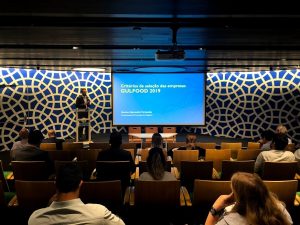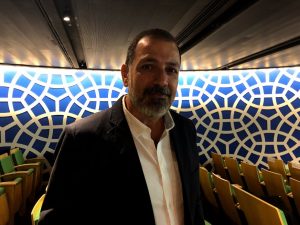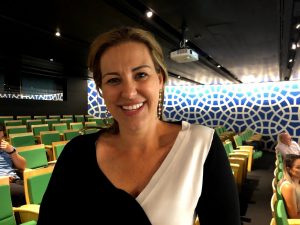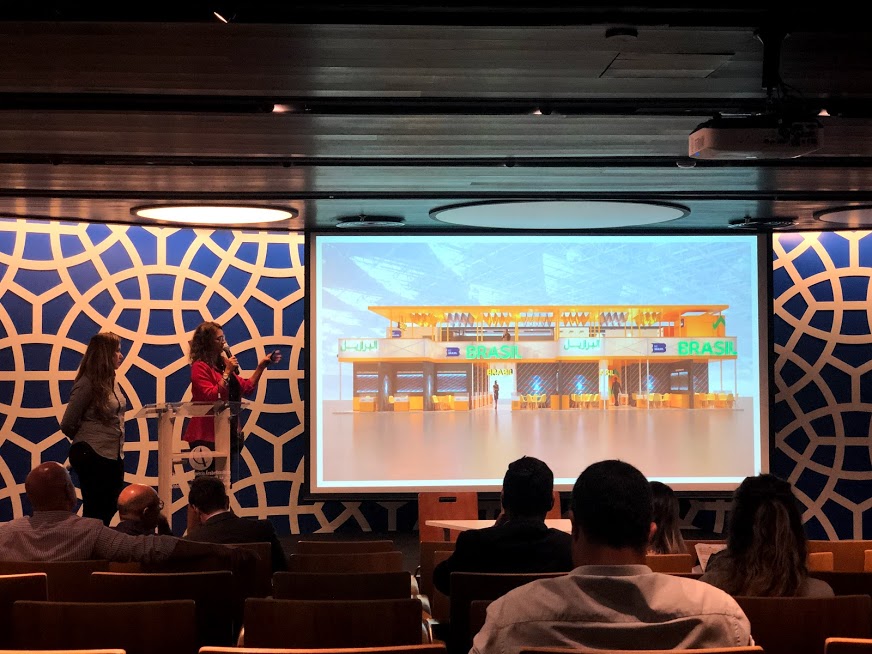São Paulo – Over 90 Brazilian food and beverage companies will join Gulfood, the leading show for the industry in the Middle East, from February 17 to 21 in Dubai, the UAE. The companies will exhibit their products in pavilions organized by the Arab Brazilian Chamber of Commerce, the Brazilian Trade and Investment Promotion Agency (Apex-Brasil), (Apex-Brasil), industry-specific organizations or in standalone fashion.
This Tuesday (15) saw Apex host a meeting with delegates from the participating companies in the Arab Chamber auditorium in São Paulo, to relay information and allocate space for each exhibitor in the agency’s stands, which will be divided into beef, poultry, grains, beverages and food products in general.
Apex business promotion coordinator Gustavo Fernandes said the companies are going to Gulfood to work on maintaining and increasing sales in the Gulf and North Africa, as well as Asia and Africa in general. Brazil has been taking part in Gulfood for ten-plus years now.

“Our view is that this is a crucial market, since the Gulf Cooperation Council (GCC) countries as a whole are Brazil’s fourth biggest trading partner. I think that in addition to those six markets, the trade show also spans Africa, Asia, the Indian and African markets, and many other countries that show up to buy product at the expo. This is one of our biggest projects in the industry, and second only to SIAL Paris,” said Fernandes. The GCC is composed of Saudi Arabia, Bahrain, Qatar, the UAE, Kuwait and Oman. SIAL Paris is one of the biggest food and beverage shows in the world.
Brazilian companies will be exhibiting items including beef and poultry, biscuits, sweets, fruits, açaí, pasta, honey, juice, coconut water, coffee and sugar. According to Fernandes, only five to ten companies are going for the first time. “This is a very relevant market and the people are really interested. They are fighting over stands. If this wasn’t a booming market they wouldn’t be so concerned, and this only proves that the companies have been going for a long time now. They are doing business and they see this event as a platform for keeping their foothold in the region, for staying in the market” the coordinator said.
Apex picked ten “poster-boy companies” that’ll be in the spotlight with products that boast a Brazilian identity, like açaí, biscuits and coconut water. Carlos von Bulow is the international commercial manager for Obrigado, a coconut water company that’s one of the poster-boys. He said the company had been to Gulfood two years ago, and now it’s better prepared for the Arab market. “We’ve adapted our labels, our packaging, our strategy, and we have the right positioning to break into the region,” he said. The drink, according to von Bulow, is in strong demand in the Middle East, especially because of the heat and the fact that alcohol is banned in several countries. The Obrigado brand does not sell in Arab countries yet, but there are buyers across the United States, Canada and Europe. “We’re in the final stages of talks with a distributor in Dubai. We hope we’ll see a deal by the end of the trade show. Kuwait and Qatar are also on the radar, and I believe we will strike deals there as well during this trip,” he said.

Another poster-boy company is Bauducco, known for its biscuits and snacks, cookies and toasts. Export manager Alain Wehbe attended the meeting at the Arab Chamber. He told ANBA that the company has been going to Gulfood for about seven years now, and it ships products to all Arab countries with the exception of Syria. Its top-selling products in the region are wafers, cookies and toasts. According to Wehbe, sales of its healthy product line are going up in Arab countries. For him, Gulfood is a place in which to meet up with clientes from across the region. They get together to make plans for the year, to talk and negotiate. The manager noted that the time of the year in which the event takes place is conducive to annual planning. “In 2018 we sold about USD 3 million in product to the Middle East. We’re hoping to see that increase by about 40% this year,” he said. The biggest international markets for Bauducco are the United States, Mercosur and Japan.
Launch
Joining Gulfood for the first time, reserves company Conservas Olé has purposely developed a product to be launched at the show: creamy guava jelly.
The company is known for its vegetable preserves in glass jars, including corn, peas, veggie mix, olives, tomato paste, and sweets, including fig in syrup.
Executive director Renata Abbas said Conservas Olé shipped its first batch to the Arab world last ear – a one-off sale to Qatar of three shipping containers’ worth of tomato paste amounting to USD 80,000. “We are hoping to get new orders from Qatar and to increase our sales in Arab countries. We are working on contacts alongside the Arab Chamber, and I’m optimistic about striking new deals,” she said. The company sells to countries including the United States, Japan, South Africa, Paraguay, Uruguay, Venezuela, Bolivia.
Cheese

Cheese brand Tirolez hadn’t been to Gulfood in a few years, according to export manager Paulo Hegg, because its capacity to supply foreign markets was limited. The dairy manufacturer ships mostly to Africa, Russia, United States and Japan. According to Hegg, it wants to go back to the food industry show in order to increase its Middle East sales. At Gulfood, it will showcase items including requeijão, coalho, prato, mozzarella, parmesan and provolone cheese. Tirolez makes cow’s milk-based cheese.
“I am hoping we’ll find partners not only in the Middle East, but also North Africa and even Asia. I hope to go back to selling to the region via Gulfood,” said Hegg.
Honey
Braseco trading director Damaris da Costa is going to Gulfood on a field study trip about the consumption of honey, considering the possibility of exporting Brazilian honey to the Middle East. “I visited companies producing honey in the (Brazilian) Northeast in November last year and saw a lot of potential, they are extremely well structured; I realized it is a niche lacking support and wanted to know more about it,” she said. The director gave the example of how Argentina, one of the largest honey exporters in the world, buys Brazilian honey, pack it and then export it as Argentine honey.
“I wanted to know how the honey market works; I’m going to take samples, we have so many kinds of honey, and I want to know which kinds the Arabs like more,” she said. Recently Saudi Arabia opened their market to buying Brazilian honey.
Candy

Itamaraty will also have a feature stand as a showcase company. Some of the main products of the candy company are the Look Wafer cookies. The export manager Nancy Gonzales said the brand has already worked at the Arab Market from the last 15 years, in countries such as Saudi Arabia, United Arab Emirates, Yemen, and Libya. Now, they work only with Libya and sold approximately USD 400,000 in cookies last year. “We hope to close new deals with Saudi Arabia, United Arab Emirates, Iraq; we are hoping to negotiate with four or five other countries during the fair,” said Gonzalez.
The Simonetto export representative Andréa Filippello said the candy company has participated in Gulfood for more than five years. Simonetto is known for its hard and chewable candies, lollipops and toffees, and sells to West Africa countries such as Angola and Equatorial Guinea but want to expand to the Arab countries and the Middle East. “We are adjusting some products, because some coloring agents are forbidden there. We made a sale to Kuwait, but it didn’t work out because they asked for a more natural colorant, so we keep adjusting, and have good prospects for the fair,” she said.
During the preparatory meeting this Tuesday, the Arab Chamber market intelligence coordinator Marcus Vinícius explained the services offered by the entity and the vantages of associating. The Arab Chamber still has slots available for associated companies to exhibit at Gulfood. For more info, click here.
Translated by Gabriel Pomerancblum & Guilherme Miranda




